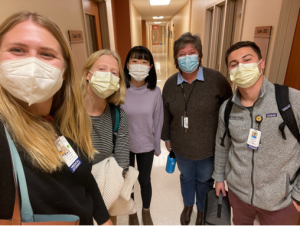Author: Ji Yoon “Angie” Kim, PharmD, Western New England University Resident
Throughout last October and November, I had the invaluable opportunity to participate in the 2022 UMass Chan Population and Community Health Clerkship which has been a transformative experience that has deepened my understanding of the impact of social determinants of health on underserved communities.
During my clerkship, I connected with residents of Franklin County, discussing the barriers to accessing healthcare. It quickly became evident that social determinants of health play a significant role in shaping the health outcomes of the population. As the only county in the state that is entirely rural, Franklin County presents unique challenges in terms of healthcare availability and accessibility. As someone who has primarily lived in metropolitan areas like Boston and Springfield, I had wrongly assumed that patients in rural areas have multiple options when it comes to community pharmacies. To my surprise, Bakers Pharmacy is the only pharmacy within a 10-mile radius, serving the residents and families of Charlemont, Buckland, Ashfield, Heath, and Shelburne.
In Franklin County, limited access to healthcare providers and broadband internet coverage poses a challenge for telemedicine, which could otherwise bridge the gap for patients who cannot easily access healthcare in person. One resident shared that their child had to “use public Wi-Fi to finish school work because there is not a reliable internet connection at home.” These eye-opening experiences have shattered my stereotypes and highlighted the impact of social determinants of health in Franklin County.
Transportation is another challenge in Franklin County. Many residents do not have access to reliable public transportation, which can limit their ability to access healthcare, employment opportunities, and other essential services. Lack of transportation options can result in delayed or missed medical appointments, reduced access to healthy food options, and limited social connections. Isolation can impact the accessibility and quality of healthcare, as well as mental health in the community. Social support systems and community engagement are vital for fostering healthier and more equitable communities. Understanding that healthcare providers alone cannot address all these factors, the importance of interprofessional care is evident.
After reviewing the Community Health Needs Assessment (CHNA) conducted by Baystate Health, it is clear that social determinants of health significantly impact the health of the Franklin community. For instance, during my conversations with residents, I came across a case where a resident had to travel to Dartmouth Hitchcock Medical Center in New Hampshire to see a specialist because there was no specialty surgeon available in Franklin County. Provider scarcity is just one of the several pressing health needs identified in the 2022 CHNA, and I was able to witness it firsthand through my interactions with residents.
Local community organizations, social workers, and community health workers play an integral part in addressing social determinants of health in Franklin County. Throughout the clerkship, I had the opportunity to collaborate with other healthcare professionals and community health workers to address these social determinants of health. Community partners from Tapestry Health at Greenfield, Deerfield EMS, Baystate Franklin Medical Center’s Moms Do Care EMPOWER Program, Bakers Pharmacy, Baystate Health & Wellness Greenfield and Department of Family Medicine, Hilltown Churches food pantry and public health nurses from Franklin Regional Council of Governments discussed various strategies to improve access to healthcare. Through this experience, I learned the importance of taking a comprehensive approach to address social determinants of health. It is not enough to focus solely on medical interventions, but rather to understand and address the underlying social, economic, and environmental factors that impact health outcomes. This requires collaboration among healthcare professionals, community organizations, and policymakers to implement sustainable solutions that address the root causes of health disparities.
As a practicing pharmacist, the experience and knowledge gained during my Population and Community Health Clerkship have transformed and deepened my understanding of the impact of social determinants of health on underserved communities like Franklin County. A comprehensive approach, involving interprofessional care, community engagement, and advocacy, is essential in addressing the complex health needs of populations. I am committed to providing value-based care to patients, collaborating with other healthcare providers and community health workers, connecting patients with available resources in the community, and advocating for healthier and more equitable communities.
I hope that sharing my experiences and reflections during my Population and Community Health Clerkship has shed light on the critical role of social determinants of health in shaping health outcomes in underserved communities. By recognizing and addressing these underlying factors, we can work towards creating healthier and more equitable communities where everyone has the opportunity to thrive. As healthcare professionals, it is our responsibility to advocate for policies and interventions that address social determinants of health and promote health equity, and to work collaboratively with other stakeholders to improve the health of the communities we serve. Together, we can make a positive impact and create a healthier future for all.
 Healthcare Workforce Partnership
Healthcare Workforce Partnership  REB - REGIONAL EMPLOYMENT BOARD OF HAMPDEN COUNTRY, INC.
REB - REGIONAL EMPLOYMENT BOARD OF HAMPDEN COUNTRY, INC.